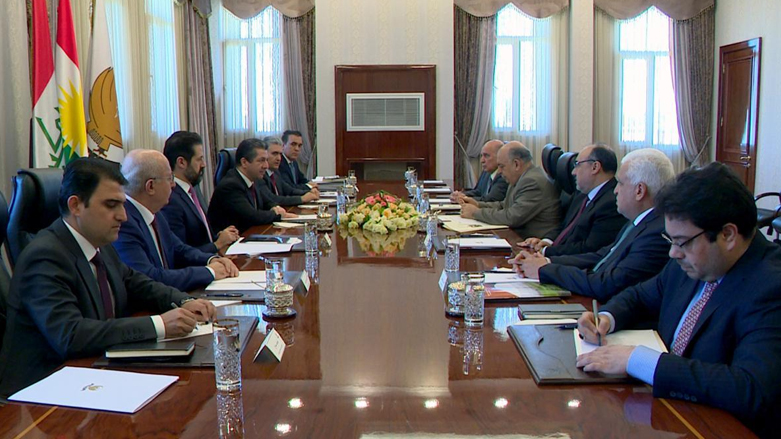KRG, Iraq make progress toward agreement aimed at settling disputes: Source

ERBIL (Kurdistan 24) – The Kurdistan Regional Government (KRG) and the Federal Government of Iraq claim to have made progress in efforts to draft an agreement aimed at resolving longstanding disputes between the two, said a source familiar with talks held on Thursday between representatives of both.
Late Wednesday night, an Iraqi delegation arrived in Erbil for a round of meetings in the regional capital the next morning. Deputy Prime Minister of the Kurdistan Region, Qubad Talabani, received the group, made up of Iraqi Finance Minister Fuad Hussein, Oil Minister Thamir Ghadhban, National Security Adviser Falih al-Fayyadh, and Chief of Staff to the Prime Minister Mohammed al-Hashimi.
Related article: High-level Iraqi delegation arrives in Kurdistan to discuss Erbil-Baghdad issues
On Thursday morning, they met with a corresponding KRG delegation, comprised of Talabani, Interior Minister Rebar Ahmed, Finance Minister Awat Janab, and with Prime Minister Barzani spearheading the team.
“In an atmosphere of positivity and mutual understanding, the main files were discussed, especially the questions of the disputed areas, financial issues, and the question of oil and gas” with the purpose of “finding a just solution for the hanging issues,” a joint statement following the meetings read.
Thursday's talks come less than ten days after a high-ranking KRG delegation, headed by Prime Minister of the Kurdistan Region Masrour Barzani, met with Iraqi President Barham Salih, Prime Minister Adil Abdul-Mahdi, and Parliament Speaker Mohammed al-Halbousi.
Ties between Erbil and Baghdad drastically spiraled following the Kurdistan Region’s independence referendum in September 2017 and remained fractured for months. Relations eventually began to improve, most noticeably after the formation of the new Iraqi government in late 2018, headed by Prime Minister Adil Abdul Mahdi.
Notable among the perennial disputes between the KRG and the Iraqi government crucial to the economies of both are the continued negotiations on oil and gas. The autonomous Kurdish government has exported its oil independently since 2013. Following the post-referendum fallout, the KRG agreed to send 250,000 barrels of oil per day (bpd) to Baghdad in exchange for the payment of civil servants’ salaries. Officials in Baghdad complain that the Kurdish leadership has failed to hold up its end of the bargain.
Another area of major concern is the status of disputed territories claimed by both governments, including Kirkuk province, which Iraqi forces along with Iran-backed Shia paramilitaries attacked following the 2017 referendum, pushing Kurdish Peshmerga forces from them. Kurds in these regions complain of rights abuses by the local government while others are the targets of insurgents' attacks, on the rise since the Peshmerga's withdrawal.
“Both sides agreed to establish a practical mechanism to investigate the details of the hanging issues by forming a number of specialized technical committees from the relevant ministries under the supervision of the joint high delegation,” continued Thursday's joint statement, adding that both sides also agreed to remain in contact to resolve all lingering disputes and that the “specialized technical committees” would meet in Baghdad next week.
The tasks these committees face, solving "all" Erbil–Baghdad disputes, is a daunting one. After agreement on the issues that have plagued all previous administrations would be reached, said the source who spoke to Kurdistan 24, a deal between the federal and regional governments reflecting the recent "significant progress" could be inked.
Prime Minister Barzani has previously stated his new administration’s aim to improve ties with Baghdad and employ dialogue to resolve longstanding disputes, saying, “The focus of my government will be how to build a stronger relationship and partnership with Baghdad.”
The Iraqi delegation also met with the President of the Kurdistan Region, Nechirvan Barzani, later that same day.
Barzani commended the efforts of the joint committee, established between the KRG and the federal government, to resolve disputes between Erbil and Baghdad within the framework of the Constitution of Iraq.
He hopped the meetings would continue to help both sides reach an understanding and, eventually, address the issues. “It is in the interest of both sides,” he said according to the statement released by the presidency’s media office.
Editing by John J. Catherine
